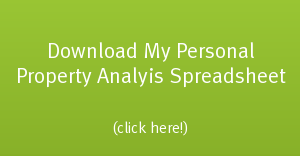This is a post (the second in a three-part series) by John Fedro of MobileHomeInvesting.net.
In my last post here at RealEstateInYourTwenties.com, I introduced myself, teased you with my simple cash-flow generating secret tool, then KAPOW!! – completely threw you a curve-ball by divulging my money-making strategy is investing in small, individual, easy-to-close mobile homes in and out of mobile home parks. I need to be brutally honest with you for the next minute…
Before we get into the meat of a cash-flow deal (next post) and talk about where all our money is made, you have to understand why sellers will sell you their unwanted mobile homes for such low prices; and conversely, why buyers will pay over retail prices for the same mobile homes. Much like any j.o.b. – you must understand your product, market, and all the players before you may truly thrive.
1. Understand Your Target Homes:
The mobile homes that will make you the most money are often times not the ones you would first believe. In a nutshell 3 bedrooms almost always outsell 2 bedrooms, and clean mobile homes always outsell mobile homes that need repairs. But what else… If you have been in real estate for any length of time you understand that it is not the cleanest or largest homes that make the most money but it is the more motivated sellers that you are truly after. The more motivated the seller, often times the more lucrative the deals end up becoming.
2. Understanding Your Buyers:
Approximately 80% of your end-buyers that call from your “Mobile Home For Sale” advertisements will not have the cash or approved credit to pay you all-cash for your mobile home. Another way to say this is that most mobile home buyers can make you a move-in payment and monthly payments for the sales price of the home. Understand that there is an ocean of buyers looking to buy a home with monthly payments instead of paying with all-cash.
What about buyers with all cash? These buyers are out there but in far less supply than buyers with some cash and great job history. Go where the demand is… payment buyers.
What about bank financing? Bank financing is very hard and restrictive to obtain especially concerning mobile homes on rented land such as inside a mobile home park.
There is a large segment of American society that are credit-conscious, hard-working and honest folks that would love to stop renting and finally own a mobile home of their own. If you choose to sell a home for all cash you are competing with all other sellers looking to sell their properties for all cash; driving home prices lower and lower. If you choose to accept monthly payments for your mobile home you can likely find tenant-buyers eager to pay over retail price for the value/opportunity to own a beautiful home.
3. Understanding Your Sellers:
My real estate investing business changed forever when I began to see my sellers for what they really are; fragile, scared, vulnerable, friendly, and selfish human beings. Let’s step outside the relationship that we typically have with mobile home and traditional real estate sellers and realize that each is a unique soul with his or her own set of skills, ambitions, loves, fears, and wants.
So what does all this mean for you: In a nutshell sellers are real people in real situations. Some sellers need to sell today, and others can wait weeks, months, or even years before becoming desperate to sell. Again some sellers are at the end of their ropes, while others have enough savings/income to ride out whatever situation is requiring/pushing them to sell. By being a mobile home investor in your area you may close deals and generate cash-flow by knowing your market and knowing what buyers will pay.
In my next post here at Realestateinyourtwenties.com you will discover an simple method to help ensure you underpay for every mobile home you purchase.
Impact a life daily,
John Fedro
John@mobilehomeinvesting.net
P.S. looking for hard money loans in California? Be sure to check out my friends over at northcoastfinancialinc.com. They have very competitive rates, can fund within a week and specialize in fix and flip loans and other hard money loans.
 If this is your first time here at Real Estate In Your Twenties.com - welcome!
If this is your first time here at Real Estate In Your Twenties.com - welcome! 





